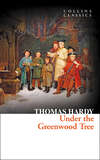Kitabı oku: «The Trumpet-Major», sayfa 21
The miller was saying some last words to him outside the house, Anne’s voice had hardly ceased singing upstairs, John was standing by the fireplace, and Mrs. Loveday was crossing the room to join her daughter, whose manner had given her some uneasiness, when a noise came from above the ceiling, as of some heavy body falling. Mrs. Loveday rushed to the staircase, saying, ‘Ah, I feared something!’ and she was followed by John.
When they entered Anne’s room, which they both did almost at one moment, they found her lying insensible upon the floor. The trumpet-major, his lips tightly closed, lifted her in his arms, and laid her upon the bed; after which he went back to the door to give room to her mother, who was bending over the girl with some hartshorn.
Presently Mrs. Loveday looked up and said to him, ‘She is only in a faint, John, and her colour is coming back. Now leave her to me; I will be downstairs in a few minutes, and tell you how she is.’
John left the room. When he gained the lower apartment his father was standing by the chimney-piece, the sailor having gone. The trumpet-major went up to the fire, and, grasping the edge of the high chimney-shelf, stood silent.
‘Did I hear a noise when I went out?’ asked the elder, in a tone of misgiving.
‘Yes, you did,’ said John. ‘It was she, but her mother says she is better now. Father,’ he added impetuously, ‘Bob is a worthless blockhead! If there had been any good in him he would have been drowned years ago!’
‘John, John – not too fast,’ said the miller. ‘That’s a hard thing to say of your brother, and you ought to be ashamed of it.’
‘Well, he tries me more than I can bear. Good God! what can a man be made of to go on as he does? Why didn’t he come home; or if he couldn’t get leave why didn’t he write? ’Tis scandalous of him to serve a woman like that!’
‘Gently, gently. The chap hev done his duty as a sailor; and though there might have been something between him and Anne, her mother, in talking it over with me, has said many times that she couldn’t think of their marrying till Bob had settled down in business with me. Folks that gain victories must have a little liberty allowed ’em. Look at the Admiral himself, for that matter.’
John continued looking at the red coals, till hearing Mrs. Loveday’s foot on the staircase, he went to meet her.
‘She is better,’ said Mrs. Loveday; ‘but she won’t come down again to-day.’
Could John have heard what the poor girl was moaning to herself at that moment as she lay writhing on the bed, he would have doubted her mother’s assurance. ‘If he had been dead I could have borne it, but this I cannot bear!’
XXXVI. DERRIMAN SEES CHANCES
Meanwhile Sailor Cornick had gone on his way as far as the forking roads, where he met Festus Derriman on foot. The latter, attracted by the seaman’s dress, and by seeing him come from the mill, at once accosted him. Jim, with the greatest readiness, fell into conversation, and told the same story as that he had related at the mill.
‘Bob Loveday going to be married?’ repeated Festus.
‘You all seem struck of a heap wi’ that.’
‘No; I never heard news that pleased me more.’
When Cornick was gone, Festus, instead of passing straight on, halted on the little bridge and meditated. Bob, being now interested elsewhere, would probably not resent the siege of Anne’s heart by another; there could, at any rate, be no further possibility of that looming duel which had troubled the yeoman’s mind ever since his horse-play on Anne at the house on the down. To march into the mill and propose to Mrs. Loveday for Anne before John’s interest could revive in her was, to this hero’s thinking, excellent discretion.
The day had already begun to darken when he entered, and the cheerful fire shone red upon the floor and walls. Mrs. Loveday received him alone, and asked him to take a seat by the chimney-corner, a little of the old hankering for him as a son-in-law having permanently remained with her.
‘Your servant, Mrs. Loveday,’ he said, ‘and I will tell you at once what I come for. You will say that I take time by the forelock when I inform you that it is to push on my long-wished-for alliance wi’ your daughter, as I believe she is now a free woman again.’
‘Thank you, Mr. Derriman,’ said the mother placably. ‘But she is ill at present. I’ll mention it to her when she is better.’
‘Ask her to alter her cruel, cruel resolves against me, on the score of – of my consuming passion for her. In short,’ continued Festus, dropping his parlour language in his warmth, ‘I’ll tell thee what, Dame Loveday, I want the maid, and must have her.’
Mrs. Loveday replied that that was very plain speaking.
‘Well, ’tis. But Bob has given her up. He never meant to marry her. I’ll tell you, Mrs. Loveday, what I have never told a soul before. I was standing upon Budmouth Quay on that very day in last September that Bob set sail, and I heard him say to his brother John that he gave your daughter up.’
‘Then it was very unmannerly of him to trifle with her so,’ said Mrs. Loveday warmly. ‘Who did he give her up to?’
Festus replied with hesitation, ‘He gave her up to John.’
‘To John? How could he give her up to a man already over head and ears in love with that actress woman?’
‘O? You surprise me. Which actress is it?’
‘That Miss Johnson. Anne tells me that he loves her hopelessly.’
Festus arose. Miss Johnson seemed suddenly to acquire high value as a sweetheart at this announcement. He had himself felt a nameless attractiveness in her, and John had done likewise. John crossed his path in all possible ways.
Before the yeoman had replied somebody opened the door, and the firelight shone upon the uniform of the person they discussed. Festus nodded on recognizing him, wished Mrs. Loveday good evening, and went out precipitately.
‘So Bob told you he meant to break off with my Anne when he went away?’ Mrs. Loveday remarked to the trumpet-major. ‘I wish I had known of it before.’
John appeared disturbed at the sudden charge. He murmured that he could not deny it, and then hastily turned from her and followed Derriman, whom he saw before him on the bridge.
‘Derriman!’ he shouted.
Festus started and looked round. ‘Well, trumpet-major,’ he said blandly.
‘When will you have sense enough to mind your own business, and not come here telling things you have heard by sneaking behind people’s backs?’ demanded John hotly. ‘If you can’t learn in any other way, I shall have to pull your ears again, as I did the other day!’
‘You pull my ears? How can you tell that lie, when you know ’twas somebody else pulled ’em?’
‘O no, no. I pulled your ears, and thrashed you in a mild way.’
‘You’ll swear to it? Surely ’twas another man?’
‘It was in the parlour at the public-house; you were almost in the dark.’ And John added a few details as to the particular blows, which amounted to proof itself.
‘Then I heartily ask your pardon for saying ’twas a lie!’ cried Festus, advancing with extended hand and a genial smile. ‘Sure, if I had known ’twas you, I wouldn’t have insulted you by denying it.’
‘That was why you didn’t challenge me, then?’
‘That was it! I wouldn’t for the world have hurt your nice sense of honour by letting ’ee go unchallenged, if I had known! And now, you see, unfortunately I can’t mend the mistake. So long a time has passed since it happened that the heat of my temper is gone off. I couldn’t oblige ’ee, try how I might, for I am not a man, trumpet-major, that can butcher in cold blood – no, not I, nor you neither, from what I know of ’ee. So, willy-nilly, we must fain let it pass, eh?’
‘We must, I suppose,’ said John, smiling grimly. ‘Who did you think I was, then, that night when I boxed you all round?’
‘No, don’t press me,’ replied the yeoman. ‘I can’t reveal; it would be disgracing myself to show how very wide of the truth the mockery of wine was able to lead my senses. We will let it be buried in eternal mixens of forgetfulness.’
‘As you wish,’ said the trumpet-major loftily. ‘But if you ever should think you knew it was me, why, you know where to find me?’ And Loveday walked away.
The instant that he was gone Festus shook his fist at the evening star, which happened to lie in the same direction as that taken by the dragoon.
‘Now for my revenge! Duels? Lifelong disgrace to me if ever I fight with a man of blood below my own! There are other remedies for upper-class souls!.. Matilda – that’s my way.’
Festus strode along till he reached the Hall, where Cripplestraw appeared gazing at him from under the arch of the porter’s lodge. Derriman dashed open the entrance-hurdle with such violence that the whole row of them fell flat in the mud.
‘Mercy, Maister Festus!’ said Cripplestraw. ‘“Surely,” I says to myself when I see ye a-coming, “surely Maister Festus is fuming like that because there’s no chance of the enemy coming this year after all.”’
‘Cr-r-ripplestraw! I have been wounded to the heart,’ replied Derriman, with a lurid brow.
‘And the man yet lives, and you wants yer horse-pistols instantly? Certainly, Maister F-’
‘No, Cripplestraw, not my pistols, but my new-cut clothes, my heavy gold seals, my silver-topped cane, and my buckles that cost more money than he ever saw! Yes, I must tell somebody, and I’ll tell you, because there’s no other fool near. He loves her heart and soul. He’s poor; she’s tip-top genteel, and not rich. I am rich, by comparison. I’ll court the pretty play-actress, and win her before his eyes.’
‘Play-actress, Maister Derriman?’
‘Yes. I saw her this very day, met her by accident, and spoke to her. She’s still in the town – perhaps because of him. I can meet her at any hour of the day – But I don’t mean to marry her; not I. I will court her for my pastime, and to annoy him. It will be all the more death to him that I don’t want her. Then perhaps he will say to me, “You have taken my one ewe lamb” – meaning that I am the king, and he’s the poor man, as in the church verse; and he’ll beg for mercy when ’tis too late – unless, meanwhile, I shall have tired of my new toy. Saddle the horse, Cripplestraw, to-morrow at ten.’
Full of this resolve to scourge John Loveday to the quick through his passion for Miss Johnson, Festus came out booted and spurred at the time appointed, and set off on his morning ride.
Miss Johnson’s theatrical engagement having long ago terminated, she would have left the Royal watering-place with the rest of the visitors had not matrimonial hopes detained her there. These had nothing whatever to do with John Loveday, as may be imagined, but with a stout, staid boat-builder in Cove Row by the quay, who had shown much interest in her impersonations. Unfortunately this substantial man had not been quite so attentive since the end of the season as his previous manner led her to expect; and it was a great pleasure to the lady to see Mr. Derriman leaning over the harbour bridge with his eyes fixed upon her as she came towards it after a stroll past her elderly wooer’s house.
‘Od take it, ma’am, you didn’t tell me when I saw you last that the tooting man with the blue jacket and lace was yours devoted?’ began Festus.
‘Who do you mean?’ In Matilda’s ever-changing emotional interests, John Loveday was a stale and unprofitable personality.
‘Why, that trumpet-major man.’
‘O! What of him?’
‘Come; he loves you, and you know it, ma’am.’
She knew, at any rate, how to take the current when it served. So she glanced at Festus, folded her lips meaningly, and nodded.
‘I’ve come to cut him out.’
She shook her head, it being unsafe to speak till she knew a little more of the subject.
‘What!’ said Festus, reddening, ‘do you mean to say that you think of him seriously – you, who might look so much higher?’
‘Constant dropping will wear away a stone; and you should only hear his pleading! His handsome face is impressive, and his manners are – O, so genteel! I am not rich; I am, in short, a poor lady of decayed family, who has nothing to boast of but my blood and ancestors, and they won’t find a body in food and clothing! – I hold the world but as the world, Derrimanio – a stage where every man must play a part, and mine a sad one!’ She dropped her eyes thoughtfully and sighed.
‘We will talk of this,’ said Festus, much affected. ‘Let us walk to the Look-out.’
She made no objection, and said, as they turned that way, ‘Mr. Derriman, a long time ago I found something belonging to you; but I have never yet remembered to return it.’ And she drew from her bosom the paper which Anne had dropped in the meadow when eluding the grasp of Festus on that summer day.
‘Zounds, I smell fresh meat!’ cried Festus when he had looked it over. ‘’Tis in my uncle’s writing, and ’tis what I heard him singing on the day the French didn’t come, and afterwards saw him marking in the road. ’Tis something he’s got hid away. Give me the paper, there’s a dear; ’tis worth sterling gold!’
‘Halves, then?’ said Matilda tenderly.
‘Gad, yes – anything!’ replied Festus, blazing into a smile, for she had looked up in her best new manner at the possibility that he might be worth the winning. They went up the steps to the summit of the cliff, and dwindled over it against the sky.
XXXVII. REACTION
There was no letter from Bob, though December had passed, and the new year was two weeks old. His movements were, however, pretty accurately registered in the papers, which John still brought, but which Anne no longer read. During the second week in December the Victory sailed for Sheerness, and on the 9th of the following January the public funeral of Lord Nelson took place in St. Paul’s.
Then there came a meagre line addressed to the family in general. Bob’s new Portsmouth attachment was not mentioned, but he told them he had been one of the eight-and-forty seamen who walked two-and-two in the funeral procession, and that Captain Hardy had borne the banner of emblems on the same occasion. The crew was soon to be paid off at Chatham, when he thought of returning to Portsmouth for a few days to see a valued friend. After that he should come home.
But the spring advanced without bringing him, and John watched Anne Garland’s desolation with augmenting desire to do something towards consoling her. The old feelings, so religiously held in check, were stimulated to rebelliousness, though they did not show themselves in any direct manner as yet.
The miller, in the meantime, who seldom interfered in such matters, was observed to look meaningly at Anne and the trumpet-major from day to day; and by-and-by he spoke privately to John.
His words were short and to the point: Anne was very melancholy; she had thought too much of Bob. Now ’twas plain that they had lost him for many years to come. Well; he had always felt that of the two he would rather John married her. Now John might settle down there, and succeed where Bob had failed. ‘So if you could get her, my sonny, to think less of him and more of thyself, it would be a good thing for all.’
An inward excitement had risen in John; but he suppressed it and said firmly —
‘Fairness to Bob before everything!’
‘He hev forgot her, and there’s an end on’t.’
‘She’s not forgot him.’
‘Well, well; think it over.’
This discourse was the cause of his penning a letter to his brother. He begged for a distinct statement whether, as John at first supposed, Bob’s verbal renunciation of Anne on the quay had been only a momentary ebullition of friendship, which it would be cruel to take literally; or whether, as seemed now, it had passed from a hasty resolve to a standing purpose, persevered in for his own pleasure, with not a care for the result on poor Anne.
John waited anxiously for the answer, but no answer came; and the silence seemed even more significant than a letter of assurance could have been of his absolution from further support to a claim which Bob himself had so clearly renounced. Thus it happened that paternal pressure, brotherly indifference, and his own released impulse operated in one delightful direction, and the trumpet-major once more approached Anne as in the old time.
But it was not till she had been left to herself for a full five months, and the blue-bells and ragged-robins of the following year were again making themselves common to the rambling eye, that he directly addressed her. She was tying up a group of tall flowering plants in the garden: she knew that he was behind her, but she did not turn. She had subsided into a placid dignity which enabled her when watched to perform any little action with seeming composure – very different from the flutter of her inexperienced days.
‘Are you never going to turn round?’ he at length asked good-humouredly.
She then did turn, and looked at him for a moment without speaking; a certain suspicion looming in her eyes, as if suggested by his perceptible want of ease.
‘How like summer it is getting to feel, is it not?’ she said.
John admitted that it was getting to feel like summer: and, bending his gaze upon her with an earnestness which no longer left any doubt of his subject, went on to ask —
‘Have you ever in these last weeks thought of how it used to be between us?’
She replied quickly, ‘O, John, you shouldn’t begin that again. I am almost another woman now!’
‘Well, that’s all the more reason why I should, isn’t it?’
Anne looked thoughtfully to the other end of the garden, faintly shaking her head; ‘I don’t quite see it like that,’ she returned.
‘You feel yourself quite free, don’t you?’
‘Quite free!’ she said instantly, and with proud distinctness; her eyes fell, and she repeated more slowly, ‘Quite free.’ Then her thoughts seemed to fly from herself to him. ‘But you are not?’
‘I am not?’
‘Miss Johnson!’
‘O – that woman! You know as well as I that was all make-up, and that I never for a moment thought of her.’
‘I had an idea you were acting; but I wasn’t sure.’
‘Well, that’s nothing now. Anne, I want to relieve your life; to cheer you in some way; to make some amends for my brother’s bad conduct. If you cannot love me, liking will be well enough. I have thought over every side of it so many times – for months have I been thinking it over – and I am at last sure that I do right to put it to you in this way. That I don’t wrong Bob I am quite convinced. As far as he is concerned we be both free. Had I not been sure of that I would never have spoken. Father wants me to take on the mill, and it will please him if you can give me one little hope; it will make the house go on altogether better if you can think o’ me.’
‘You are generous and good, John,’ she said, as a big round tear bowled helter-skelter down her face and hat-strings.
‘I am not that; I fear I am quite the opposite,’ he said, without looking at her. ‘It would be all gain to me – But you have not answered my question.’
She lifted her eyes. ‘John, I cannot!’ she said, with a cheerless smile. ‘Positively I cannot. Will you make me a promise?’
‘What is it?’
‘I want you to promise first – Yes, it is dreadfully unreasonable,’ she added, in a mild distress. ‘But do promise!’
John by this time seemed to have a feeling that it was all up with him for the present. ‘I promise,’ he said listlessly.
‘It is that you won’t speak to me about this for ever so long,’ she returned, with emphatic kindliness.
‘Very good,’ he replied; ‘very good. Dear Anne, you don’t think I have been unmanly or unfair in starting this anew?’
Anne looked into his face without a smile. ‘You have been perfectly natural,’ she murmured. ‘And so I think have I.’
John, mournfully: ‘You will not avoid me for this, or be afraid of me? I will not break my word. I will not worry you any more.’
‘Thank you, John. You need not have said worry; it isn’t that.’
‘Well, I am very blind and stupid. I have been hurting your heart all the time without knowing it. It is my fate, I suppose. Men who love women the very best always blunder and give more pain than those who love them less.’
Anne laid one of her hands on the other as she softly replied, looking down at them, ‘No one loves me as well as you, John; nobody in the world is so worthy to be loved; and yet I cannot anyhow love you rightly.’ And lifting her eyes, ‘But I do so feel for you that I will try as hard as I can to think about you.’
‘Well, that is something,’ he said, smiling. ‘You say I must not speak about it again for ever so long; how long?’
‘Now that’s not fair,’ Anne retorted, going down the garden, and leaving him alone.
About a week passed. Then one afternoon the miller walked up to Anne indoors, a weighty topic being expressed in his tread.
‘I was so glad, my honey,’ he began, with a knowing smile, ‘to see that from the mill-window last week.’ He flung a nod in the direction of the garden.
Anne innocently inquired what it could be.
‘Jack and you in the garden together,’ he continued laying his hand gently on her shoulder and stroking it. ‘It would so please me, my dear little girl, if you could get to like him better than that weathercock, Master Bob.’
Anne shook her head; not in forcible negation, but to imply a kind of neutrality.
‘Can’t you? Come now,’ said the miller.
She threw back her head with a little laugh of grievance. ‘How you all beset me!’ she expostulated. ‘It makes me feel very wicked in not obeying you, and being faithful – faithful to – ’ But she could not trust that side of the subject to words. ‘Why would it please you so much?’ she asked.
‘John is as steady and staunch a fellow as ever blowed a trumpet. I’ve always thought you might do better with him than with Bob. Now I’ve a plan for taking him into the mill, and letting him have a comfortable time o’t after his long knocking about; but so much depends upon you that I must bide a bit till I see what your pleasure is about the poor fellow. Mind, my dear, I don’t want to force ye; I only just ask ye.’
Anne meditatively regarded the miller from under her shady eyelids, the fingers of one hand playing a silent tattoo on her bosom. ‘I don’t know what to say to you,’ she answered brusquely, and went away.
But these discourses were not without their effect upon the extremely conscientious mind of Anne. They were, moreover, much helped by an incident which took place one evening in the autumn of this year, when John came to tea. Anne was sitting on a low stool in front of the fire, her hands clasped across her knee. John Loveday had just seated himself on a chair close behind her, and Mrs. Loveday was in the act of filling the teapot from the kettle which hung in the chimney exactly above Anne. The kettle slipped forward suddenly, whereupon John jumped from the chair and put his own two hands over Anne’s just in time to shield them, and the precious knee she clasped, from the jet of scalding water which had directed itself upon that point. The accidental overflow was instantly checked by Mrs. Loveday; but what had come was received by the devoted trumpet-major on the back of his hands.
Anne, who had hardly been aware that he was behind her, started up like a person awakened from a trance. ‘What have you done to yourself, poor John, to keep it off me!’ she cried, looking at his hands.
John reddened emotionally at her words, ‘It is a bit of a scald, that’s all,’ he replied, drawing a finger across the back of one hand, and bringing off the skin by the touch.
‘You are scalded painfully, and I not at all!’ She gazed into his kind face as she had never gazed there before, and when Mrs. Loveday came back with oil and other liniments for the wound Anne would let nobody dress it but herself. It seemed as if her coyness had all gone, and when she had done all that lay in her power she still sat by him. At his departure she said what she had never said to him in her life before: ‘Come again soon!’
In short, that impulsive act of devotion, the last of a series of the same tenor, had been the added drop which finally turned the wheel. John’s character deeply impressed her. His determined steadfastness to his lode star won her admiration, the more especially as that star was herself. She began to wonder more and more how she could have so persistently held out against his advances before Bob came home to renew girlish memories which had by that time got considerably weakened. Could she not, after all, please the miller, and try to listen to John? By so doing she would make a worthy man happy, the only sacrifice being at worst that of her unworthy self, whose future was no longer valuable. ‘As for Bob, the woman is to be pitied who loves him,’ she reflected indignantly, and persuaded herself that, whoever the woman might be, she was not Anne Garland.
After this there was something of recklessness and something of pleasantry in the young girl’s manner of making herself an example of the triumph of pride and common sense over memory and sentiment. Her attitude had been epitomized in her defiant singing at the time she learnt that Bob was not leal and true. John, as was inevitable, came again almost immediately, drawn thither by the sun of her first smile on him, and the words which had accompanied it. And now instead of going off to her little pursuits upstairs, downstairs, across the room, in the corner, or to any place except where he happened to be, as had been her custom hitherto, she remained seated near him, returning interesting answers to his general remarks, and at every opportunity letting him know that at last he had found favour in her eyes.
The day was fine, and they went out of doors, where Anne endeavoured to seat herself on the sloping stone of the window-sill.
‘How good you have become lately,’ said John, standing over her and smiling in the sunlight which blazed against the wall. ‘I fancy you have stayed at home this afternoon on my account.’
‘Perhaps I have,’ she said gaily —
‘“Do whatever we may for him, dame, we cannot do too much!
For he’s one that has guarded our land.”
‘And he has done more than that: he has saved me from a dreadful scalding. The back of your hand will not be well for a long time, John, will it?’
He held out his hand to regard its condition, and the next natural thing was to take hers. There was a glow upon his face when he did it: his star was at last on a fair way towards the zenith after its long and weary declination. The least penetrating eye could have perceived that Anne had resolved to let him woo, possibly in her temerity to let him win. Whatever silent sorrow might be locked up in her, it was by this time thrust a long way down from the light.
‘I want you to go somewhere with me if you will,’ he said, still holding her hand.
‘Yes? Where is it?’
He pointed to a distant hill-side which, hitherto green, had within the last few days begun to show scratches of white on its face. ‘Up there,’ he said.
‘I see little figures of men moving about. What are they doing?’
‘Cutting out a huge picture of the king on horseback in the earth of the hill. The king’s head is to be as big as our mill-pond and his body as big as this garden; he and the horse will cover more than an acre. When shall we go?’
‘Whenever you please,’ said she.
‘John!’ cried Mrs. Loveday from the front door. ‘Here’s a friend come for you.’
John went round, and found his trusty lieutenant, Trumpeter Buck, waiting for him. A letter had come to the barracks for John in his absence, and the trumpeter, who was going for a walk, had brought it along with him. Buck then entered the mill to discuss, if possible, a mug of last year’s mead with the miller; and John proceeded to read his letter, Anne being still round the corner where he had left her. When he had read a few words he turned as pale as a sheet, but he did not move, and perused the writing to the end.
Afterwards he laid his elbow against the wall, and put his palm to his head, thinking with painful intentness. Then he took himself vigorously in hand, as it were, and gradually became natural again. When he parted from Anne to go home with Buck she noticed nothing different in him.
In barracks that evening he read the letter again. It was from Bob; and the agitating contents were these: —
‘Dear John, – I have drifted off from writing till the present time because I have not been clear about my feelings; but I have discovered them at last, and can say beyond doubt that I mean to be faithful to my dearest Anne after all. The fact is, John, I’ve got into a bit of a scrape, and I’ve a secret to tell you about it (which must go no further on any account). On landing last autumn I fell in with a young woman, and we got rather warm as folks do; in short, we liked one another well enough for a while. But I have got into shoal water with her, and have found her to be a terrible take-in. Nothing in her at all – no sense, no niceness, all tantrums and empty noise, John, though she seemed monstrous clever at first. So my heart comes back to its old anchorage. I hope my return to faithfulness will make no difference to you. But as you showed by your looks at our parting that you should not accept my offer to give her up – made in too much haste, as I have since found – I feel that you won’t mind that I have returned to the path of honour. I dare not write to Anne as yet, and please do not let her know a word about the other young woman, or there will be the devil to pay. I shall come home and make all things right, please God. In the meantime I should take it as a kindness, John, if you would keep a brotherly eye upon Anne, and guide her mind back to me. I shall die of sorrow if anybody sets her against me, for my hopes are getting bound up in her again quite strong. Hoping you are jovial, as times go, I am, – Your affectionate brother,
Robert.’
When the cold daylight fell upon John’s face, as he dressed himself next morning, the incipient yesterday’s wrinkle in his forehead had become permanently graven there. He had resolved, for the sake of that only brother whom he had nursed as a baby, instructed as a child, and protected and loved always, to pause in his procedure for the present, and at least do nothing to hinder Bob’s restoration to favour, if a genuine, even though temporarily smothered, love for Anne should still hold possession of him. But having arranged to take her to see the excavated figure of the king, he started for Overcombe during the day, as if nothing had occurred to check the smooth course of his love.










